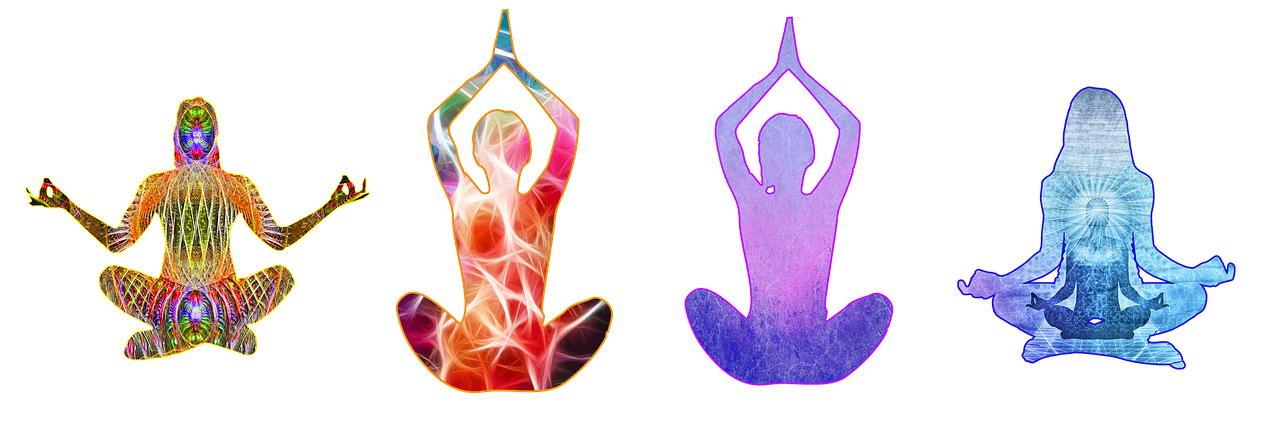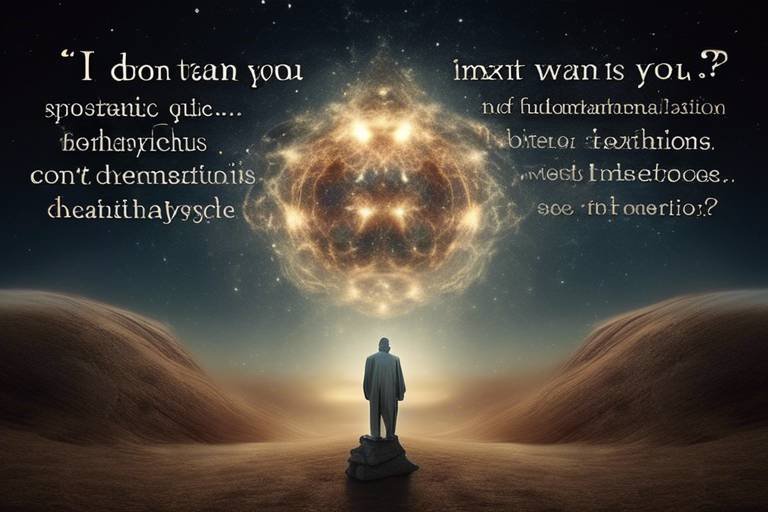Metaphysics and Philosophy of Mind: Intersections and Overlaps
The realms of metaphysics and the philosophy of mind are deeply intertwined, creating a rich tapestry of inquiry that challenges our understanding of reality, existence, and consciousness. At their core, these fields grapple with some of the most profound questions about what it means to be alive and aware. As we embark on this exploration, it’s essential to recognize that metaphysics is concerned with the fundamental nature of reality, while the philosophy of mind focuses specifically on the nature of consciousness and mental states. Together, they delve into questions like: What is consciousness? How do our minds interact with the physical world? And what does it mean to truly exist?
One of the most fascinating aspects of this intersection is how various metaphysical theories shape our understanding of consciousness. For instance, consider the age-old question: Is consciousness merely a byproduct of brain activity, or is it something more profound, perhaps even transcendent? This debate not only illuminates the philosophical inquiries surrounding our mental lives but also raises critical implications for our understanding of reality itself. The answers we seek can lead us down divergent paths—some suggesting a purely physicalist view where everything can be explained by science, while others posit the existence of non-physical dimensions of consciousness.
Furthermore, as we navigate through these philosophical waters, we encounter a myriad of perspectives that challenge our intuitions and beliefs. For example, the concept of mind-body dualism posits that the mind and body are fundamentally different substances. This idea, championed by philosophers like René Descartes, raises questions about identity and existence that continue to resonate today. In contrast, the rise of materialism and its assertion that everything, including thoughts and feelings, is rooted in the physical realm complicates our understanding of mental phenomena. This ongoing dialogue between dualism and materialism illustrates the dynamic nature of metaphysical inquiry.
As we explore these intersections, we also confront the problem of other minds, a classic philosophical dilemma that questions how we can know that other minds exist beyond our own. This issue not only challenges our assumptions about consciousness but also prompts us to consider the metaphysical implications of our interactions with others. Can we truly understand another person's experience, or are we forever confined to the boundaries of our own minds? Such questions push us to reflect on the nature of empathy, communication, and the shared human experience.
Lastly, the debate surrounding free will and determinism adds another layer to our exploration of the philosophy of mind. These discussions have significant metaphysical implications, as they challenge our notions of moral responsibility and agency. Are our choices predetermined by a series of prior causes, or do we possess the freedom to shape our destinies? The various philosophical perspectives, including compatibilism and libertarianism, offer contrasting views that enrich our understanding of human behavior and ethics.
In summary, the intersections of metaphysics and the philosophy of mind create a vibrant landscape of inquiry that invites us to question our understanding of consciousness, existence, and reality. As we continue to explore these profound themes, we find ourselves grappling with the very essence of what it means to be human, challenging us to think deeply about our place in the universe.
- What is metaphysics? Metaphysics is a branch of philosophy that explores the fundamental nature of reality, including concepts such as being, existence, and the universe.
- How does the philosophy of mind relate to metaphysics? The philosophy of mind examines consciousness and mental states, often intersecting with metaphysical questions about the nature of reality and existence.
- What is mind-body dualism? Mind-body dualism is the belief that the mind and body are distinct and separate substances, a view famously associated with René Descartes.
- What are the challenges to dualism? Critics of dualism often advocate for physicalism or monism, arguing that everything, including mental states, can be explained in physical terms.
- What is the problem of other minds? This philosophical issue questions how we can know that other minds exist beyond our own and what that means for our understanding of consciousness.

The Nature of Consciousness
When we dive into the nature of consciousness, we find ourselves navigating a complex and often bewildering landscape. What does it truly mean to be conscious? Is consciousness merely a byproduct of brain activity, or does it represent something more profound? These questions have puzzled philosophers and scientists alike for centuries, and as we explore various theories, we can see how metaphysical perspectives shape our understanding of this enigmatic phenomenon.
At its core, consciousness refers to our awareness of ourselves and the world around us. It encompasses our thoughts, emotions, perceptions, and experiences. But here's where it gets interesting: different philosophical traditions offer unique insights into the essence of consciousness. For instance, some argue that consciousness is an emergent property of complex systems, while others posit that it is a fundamental aspect of reality itself. This divergence in thought leads to various theories, each with its own implications for our understanding of existence.
One of the most prominent theories is the dual-aspect theory, which suggests that mental and physical states are two sides of the same coin. According to this view, consciousness cannot be fully understood without considering both the mental and the physical. This duality raises intriguing questions about the relationship between the mind and the brain. For example, if our thoughts and feelings are intrinsically linked to neural processes, how do we account for subjective experiences, often referred to as qualia? This is where metaphysics comes into play, challenging us to think deeper about the fabric of reality.
Another fascinating perspective is the panpsychism theory, which posits that consciousness is a fundamental feature of all matter. Imagine a world where even the tiniest particles possess some form of consciousness—how would that change our understanding of existence? This idea invites us to reconsider the boundaries of consciousness, suggesting that it may not be limited to humans or even animals, but rather, it could be a universal trait that permeates the cosmos.
Moreover, contemporary discussions in neuroscience have significantly influenced our understanding of consciousness. Advances in brain imaging techniques allow scientists to observe brain activity in real-time, providing insights into how different regions of the brain contribute to conscious experience. However, while neuroscience offers valuable data, it often leaves us grappling with the "hard problem" of consciousness—how and why do physical processes give rise to subjective experiences? This is where the intersection of metaphysics and philosophy of mind becomes particularly rich and compelling.
In summary, the nature of consciousness is a multifaceted issue that intertwines metaphysical inquiry with philosophical exploration. As we unravel the threads of consciousness, we are compelled to confront profound questions about reality, existence, and what it means to be aware. As we continue to explore these intersections, we may find that the journey is just as important as the answers we seek.
- What is consciousness? Consciousness is the state of being aware of and able to think about one's own existence, thoughts, and surroundings.
- How does metaphysics relate to consciousness? Metaphysics explores the fundamental nature of reality, including the nature of consciousness, existence, and the relationship between mind and body.
- What are the main theories of consciousness? Key theories include dualism, physicalism, panpsychism, and emergentism, each offering different perspectives on the nature of consciousness.
- Can consciousness exist without a physical body? This question is a subject of debate; some philosophies argue for the independence of consciousness, while others maintain it is inherently tied to physical processes.

Mind-Body Dualism
Mind-body dualism is a fascinating concept that has intrigued philosophers for centuries. At its core, dualism posits that there are two distinct kinds of substances: the mental and the physical. This idea raises profound questions about our existence, identity, and the very nature of reality. Imagine for a moment that your mind is like a software program running on the hardware of your brain. While the software (your thoughts, emotions, and consciousness) is intangible, the hardware (your brain and body) is very much physical. This metaphor encapsulates the essence of dualism, which argues that these two realms, while interconnected, operate independently.
The historical roots of mind-body dualism can be traced back to the works of philosophers like René Descartes, who famously stated, "Cogito, ergo sum" ("I think, therefore I am"). Descartes believed that the mind is a non-physical substance that interacts with the physical body. This perspective set the stage for countless debates about the nature of existence and identity. The implications of dualism are vast, sparking discussions about how mental states can affect physical actions and vice versa. For instance, when you feel anxious (a mental state), your heart races (a physical response). This interplay raises questions: How can something non-physical influence the physical world? And if they are so intertwined, why should we consider them separate in the first place?
Despite its historical significance, mind-body dualism faces numerous challenges in contemporary philosophy. Critics argue that the separation of mind and body creates more problems than it solves. For example, how can a non-physical mind interact with a physical body without violating the laws of physics? This leads us to consider alternative perspectives such as physicalism and monism, which propose that everything is fundamentally physical, including mental phenomena. In this view, consciousness is not a separate entity but rather a product of complex physical processes occurring within the brain.
To illustrate the contrasts between these perspectives, consider the following table:
| Aspect | Mind-Body Dualism | Physicalism |
|---|---|---|
| Nature of Mind | Non-physical substance | Physical phenomenon |
| Interaction | Mind influences body | Brain processes influence mind |
| Identity | Separate entities | Unified existence |
As we navigate through these philosophical waters, the implications of mind-body dualism extend beyond mere academic debate. They touch on our everyday experiences, shaping how we understand mental health, consciousness, and even morality. For instance, if we accept dualism, we might view mental health issues as a problem of the mind that needs separate treatment from physical ailments. Conversely, a physicalist approach would encourage us to seek solutions that address the brain's functioning, perhaps through neurological interventions.
In conclusion, mind-body dualism presents a compelling framework for exploring the intricate relationship between the mind and the body. While it has its challenges, the ongoing dialogue between dualism and alternative theories enriches our understanding of consciousness and existence itself. The questions it raises are not just theoretical; they resonate deeply with our personal experiences and shape how we perceive ourselves and the world around us.
- What is mind-body dualism? Mind-body dualism is the philosophical view that the mind and body are two distinct entities that interact with each other.
- Who is the main proponent of dualism? René Descartes is often credited as the primary proponent of mind-body dualism.
- What are the main criticisms of dualism? Critics argue that dualism fails to explain how non-physical substances can interact with physical substances without violating scientific principles.
- How does dualism relate to mental health? Dualism suggests that mental health issues are primarily problems of the mind, which could lead to different treatment approaches compared to a physicalist perspective.

Descartes and Dualism
René Descartes, a towering figure in the realm of philosophy, is often heralded as the architect of mind-body dualism. His groundbreaking work in the 17th century laid the foundation for a profound debate that continues to resonate today. Descartes famously declared, "Cogito, ergo sum," or "I think, therefore I am," which encapsulates his belief in the distinct separation between the mind and the body. He posited that the mind, a non-material substance, is fundamentally different from the body, which is composed of physical matter. This distinction raises a plethora of questions about the nature of existence, consciousness, and identity.
To understand Descartes' dualism, we must delve into his seminal work, "Meditations on First Philosophy." Here, he articulates his doubts about the physical world, leading him to conclude that while he can doubt the existence of his body, he cannot doubt the existence of his thoughts. This realization suggests that the mind is an independent entity, capable of existing apart from the body. Descartes' dualism can be summarized in two key points:
- Substance Dualism: Descartes argued that the mind and body are composed of different substances; the mind is immaterial, while the body is material.
- Interactionism: He also believed that these two substances interact with each other, influencing thoughts and actions.
The implications of Descartes' dualism are vast, prompting philosophers to explore the nature of consciousness and the metaphysical underpinnings of human identity. His ideas invite us to ponder questions such as: If the mind is separate from the body, how do they communicate? What does this mean for our understanding of personal identity? These inquiries have generated a rich tapestry of philosophical discourse, influencing not only metaphysics but also psychology, neuroscience, and ethics.
However, Descartes' dualism has not gone unchallenged. Critics argue that the notion of two distinct substances raises more questions than it answers. For instance, if the mind and body are separate, how can they interact? This conundrum is often referred to as the "interaction problem." Furthermore, contemporary advancements in neuroscience suggest that mental states are closely tied to physical processes in the brain, leading many to advocate for a more integrated view of mind and body.
In summary, Descartes' contributions to the philosophy of mind through his dualistic framework have sparked a lasting dialogue about the nature of consciousness and existence. His assertion that the mind is a distinct entity continues to provoke thought and debate, making it a cornerstone of metaphysical inquiry. As we navigate the complexities of consciousness, Descartes' legacy remains a significant touchstone, urging us to explore the intricate relationship between our thoughts and our physical selves.
- What is mind-body dualism?
Mind-body dualism is the philosophical view that the mind and body are distinct entities that interact with each other. This idea was prominently articulated by René Descartes.
- How does Descartes support dualism?
Descartes supports dualism through his famous assertion "Cogito, ergo sum," arguing that while he can doubt the existence of his body, he cannot doubt the existence of his thoughts.
- What are the criticisms of dualism?
Critics of dualism argue that it creates problems regarding how the mind and body interact and that scientific advancements in neuroscience suggest a more integrated view of mental and physical processes.

Challenges to Dualism
The concept of mind-body dualism has stood the test of time, dating back to the philosophical musings of figures like René Descartes. However, as our understanding of the mind and body has evolved, so too have the challenges to this traditional view. One of the most significant criticisms of dualism is its inability to clearly explain how two distinct substances—mental and physical—interact. If the mind is non-physical, how does it influence the physical body? This question has puzzled philosophers and scientists alike, leading many to seek alternative explanations.
In recent years, the rise of physicalism and monism has further complicated the dualist perspective. Physicalism posits that everything that exists is physical, including mental states. This view suggests that consciousness arises from physical processes in the brain, challenging the notion that the mind exists independently of the body. As a result, many argue that dualism is not only outdated but also inconsistent with contemporary scientific understanding.
Moreover, advances in neuroscience have provided compelling evidence that mental phenomena can be mapped to brain activity. For instance, studies using brain imaging techniques have shown that specific thoughts and emotions correspond to particular neural patterns. This evidence raises questions about the necessity of a non-physical mind, as it appears that our mental experiences can be fully explained through physical processes.
Another challenge to dualism is the problem of other minds. If we accept that minds are non-physical, how can we be sure that other beings possess minds similar to our own? This leads to a form of skepticism that is difficult to reconcile with our everyday experiences. If dualism cannot satisfactorily address the existence of other minds, it risks being dismissed as an inadequate framework for understanding consciousness.
Lastly, the dualist perspective often struggles to account for the seamless integration of mental and physical experiences. Consider how emotions can trigger physical reactions; for example, feeling anxious can lead to a racing heart. This interdependence suggests a more unified approach to understanding the mind-body relationship, one that dualism fails to provide. As we delve deeper into the intricacies of consciousness, it becomes increasingly clear that the challenges to dualism are not merely academic; they have profound implications for our understanding of existence itself.
- What is mind-body dualism? Mind-body dualism is the philosophical view that the mind and body are fundamentally distinct entities, with the mind being non-physical and the body being physical.
- What are the main challenges to dualism? The primary challenges include the interaction problem, the rise of physicalism, advancements in neuroscience, the problem of other minds, and the difficulty in explaining the integration of mental and physical experiences.
- How does neuroscience challenge dualism? Neuroscience shows that mental states can be correlated with brain activity, suggesting that consciousness may arise from physical processes rather than existing as a separate, non-physical entity.
- What is physicalism? Physicalism is the view that everything that exists, including mental states, is physical and can be explained through physical processes.

Materialism and the Mind
Materialism is a philosophical viewpoint asserting that everything that exists is fundamentally physical. When we talk about the mind, this perspective becomes particularly intriguing because it challenges us to consider how our thoughts, feelings, and experiences can emerge from mere physical processes. Imagine your mind as a complex machine, where every thought is a gear turning, driven by the physical interactions occurring in your brain. This analogy highlights the essence of materialism: the belief that mental phenomena are not separate from physical processes but are instead a product of them.
One of the core tenets of materialism is that all mental states can be reduced to physical states. This means that every emotion you feel, every decision you make, and every memory you recall can theoretically be traced back to brain activity. For instance, when you feel happiness, it's not just a fleeting emotional experience; it's a series of neurochemical reactions and electrical impulses in your brain that give rise to that feeling. This leads to significant implications for metaphysical discussions about consciousness, as it suggests that understanding the brain's workings could eventually unlock the mysteries of the mind.
Materialism also intersects with the philosophy of mind in various ways. It raises questions about the nature of consciousness itself. If everything is physical, can consciousness be fully explained by physical processes? Or is there something more, something non-physical that we have yet to understand? This question creates a fascinating tension between materialist views and other philosophical perspectives, such as dualism, which posits that the mind and body are distinct entities.
In the realm of neuroscience, materialism finds its most robust ally. As scientific advancements continue to unveil the intricacies of the human brain, we gain insights that challenge traditional metaphysical views. Neuroscience posits that our thoughts and behaviors are closely linked to specific neural activities. For example, studies have shown that certain stimuli can trigger predictable responses in our brains, suggesting a direct relationship between our physical state and our mental experiences. This connection blurs the lines between mind and body, supporting a materialist interpretation of consciousness.
However, materialism is not without its critics. Some argue that reducing mental experiences to mere physical processes overlooks the richness of human consciousness. They posit that there are aspects of our experiences—like qualia, the subjective qualities of our perceptions—that cannot be fully captured by a physicalist approach. For instance, how do you explain the experience of tasting chocolate? While we can describe the chemical reactions and brain activity involved, the subjective pleasure of that experience feels distinctly non-physical. This tension invites ongoing debate about the nature of reality and existence.
To summarize, materialism presents a compelling framework for understanding the mind, emphasizing the physical basis of mental phenomena. It challenges us to reconsider our assumptions about consciousness and pushes the boundaries of philosophical inquiry. As we continue to explore the intersections of materialism and the philosophy of mind, we may uncover deeper truths about our existence, consciousness, and the very fabric of reality.
- What is materialism in the context of philosophy?
Materialism is the belief that everything that exists is physical, and all phenomena, including mental states, can be explained in terms of physical processes. - How does materialism relate to neuroscience?
Materialism aligns with neuroscience by suggesting that our mental experiences are rooted in brain activity, thus proposing that understanding the brain can lead to insights about consciousness. - What are the criticisms of materialism?
Critics argue that materialism oversimplifies mental experiences, particularly the subjective qualities of consciousness, which may not be fully explained by physical processes alone.

Physicalism Explained
Physicalism, in its essence, is the philosophical stance that asserts that everything that exists is ultimately physical in nature. This viewpoint challenges the dualistic perspective that separates the mind from the body, positing instead that mental states are entirely dependent on physical processes. To put it simply, if you can touch it, see it, or measure it, it exists. This idea has profound implications for our understanding of consciousness, identity, and existence itself.
At the heart of physicalism is the belief that all phenomena, including thoughts, emotions, and experiences, can be explained through physical interactions and processes. This perspective aligns closely with the advancements in neuroscience, which have shown how brain activity correlates with mental states. The implications of this are staggering; it suggests that our thoughts and feelings are not ethereal substances but rather the result of complex biochemical processes in our brains.
One of the primary tenets of physicalism is the idea of reductionism. This concept holds that complex systems can be understood by examining their simpler components. For example, the experience of pain can be analyzed through the activation of specific neurons and neurotransmitters in the brain. Here’s a breakdown of how reductionism plays a crucial role in physicalism:
- Neuroscience: Advances in brain imaging have allowed scientists to observe which areas of the brain are active during specific mental tasks.
- Behavioral Psychology: This field studies how physical stimuli lead to observable behaviors, reinforcing the idea that mental states have a tangible basis.
- Philosophical Implications: If everything can be reduced to physical processes, then questions about the mind's nature must be approached from a material standpoint.
Critics of physicalism often argue that it fails to account for the subjective experience of consciousness, known as qualia. Qualia refer to the individual instances of subjective, conscious experience—like the taste of chocolate or the color red. Detractors argue that these experiences cannot be fully explained by physical processes alone. However, physicalists counter that while qualia are indeed subjective, they can still be understood as products of physical interactions in the brain.
In summary, physicalism offers a compelling framework for understanding the mind and consciousness. It challenges us to reconsider our notions of identity and existence, urging a shift from metaphysical speculations to empirical investigations. As science continues to unveil the mysteries of the brain, the physicalist perspective remains at the forefront of philosophical inquiry, inviting us to explore the intricate dance between the physical and the mental.
- What is physicalism? Physicalism is the philosophical view that everything that exists is physical, and mental states are dependent on physical processes.
- How does physicalism relate to consciousness? Physicalism suggests that consciousness arises from physical interactions in the brain, challenging dualistic views that separate mind and body.
- What are qualia? Qualia are the subjective experiences of perception, such as the taste of chocolate or the color red, which some argue cannot be fully explained by physicalism.
- Can physicalism explain free will? Physicalism complicates the notion of free will, as it posits that all actions are determined by physical processes, raising questions about moral responsibility.

Neuroscience and Philosophy
Neuroscience and philosophy are like two sides of the same coin, each providing unique insights into the complex nature of the mind. As we delve into the intricate workings of the brain, neuroscience unveils the biological and chemical processes that underpin our thoughts, emotions, and behaviors. But what does this mean for philosophy? Can the empirical findings of neuroscience truly inform our understanding of consciousness, or do they merely scratch the surface of a deeper metaphysical reality?
One of the most fascinating aspects of this intersection is how neuroscience challenges traditional philosophical views. For instance, the discovery of mirror neurons has sparked discussions about empathy and social cognition, prompting philosophers to reconsider what it means to understand another's mind. If our brains are wired to resonate with others' experiences, does this imply that our consciousness is not as isolated as we once thought? This leads us to ponder the metaphysical implications of shared experiences and the nature of selfhood.
Moreover, the advancements in neuroimaging techniques, such as fMRI and PET scans, have allowed scientists to observe brain activity in real-time. This capability raises profound questions about free will and determinism. If our decisions can be predicted based on neural patterns, does this undermine our sense of agency? Philosophers are now grappling with the implications of these findings, debating whether our subjective experiences of choice are mere illusions shaped by our brain's wiring.
To further illustrate this relationship, consider the following table that summarizes key contributions from neuroscience to philosophical discussions:
| Neuroscience Discovery | Philosophical Implication |
|---|---|
| Mirror Neurons | Challenges the notion of the isolated self and enhances understanding of empathy. |
| Neuroimaging Techniques | Raises questions about free will, prompting debates on determinism. |
| Brain Plasticity | Suggests that experiences can reshape our consciousness, impacting identity and self-perception. |
As we navigate this fascinating terrain, it's essential to recognize that neuroscience does not negate philosophical inquiry; rather, it enriches it. The dialogue between these two fields is crucial for a comprehensive understanding of consciousness. While neuroscience provides the empirical data, philosophy offers the frameworks to interpret these findings. Together, they illuminate the profound mysteries of the mind, urging us to rethink our assumptions about reality, existence, and what it truly means to be conscious.
In conclusion, the interplay between neuroscience and philosophy is not just an academic exercise; it's a journey into the heart of what it means to be human. As we continue to uncover the secrets of the brain, the philosophical implications of these discoveries will undoubtedly shape our understanding of ourselves and the world around us.
- How does neuroscience impact our understanding of consciousness?
Neuroscience provides empirical evidence about brain functions, which can reshape our philosophical views on consciousness and self-awareness. - Can philosophy still hold relevance in the age of neuroscience?
Absolutely! Philosophy helps interpret the findings of neuroscience, offering deeper insights into the implications of these discoveries. - What is the significance of mirror neurons in philosophical discussions?
Mirror neurons suggest that our understanding of others may be more interconnected than previously thought, challenging the notion of an isolated self. - Are free will and determinism compatible?
This is a hotly debated topic. Neuroscience raises questions about determinism, while philosophy explores the nuances of free will in light of these findings.

The Problem of Other Minds
The classic philosophical dilemma known as invites us to ponder a question that seems deceptively simple yet profoundly complex: How can we know that other minds exist? This inquiry digs deep into the metaphysical implications of consciousness and challenges our understanding of reality. Imagine walking into a bustling café, where laughter and conversation swirl around you like a warm breeze. You see people animatedly discussing their lives, yet you can only perceive their outward behaviors and expressions. This raises a significant question: are those internal thoughts and emotions truly accessible to you, or are they forever locked away in the private realm of their minds?
Philosophers have grappled with this issue for centuries, often highlighting the limitations of our own subjective experience. The crux of the problem lies in the fact that we can only directly experience our own thoughts and feelings, leaving us to rely on inference when it comes to understanding the mental states of others. This leads to a few intriguing points:
- We often assume that others experience the world similarly to us because they exhibit similar behaviors.
- However, these behaviors may not accurately reflect their internal states, leading to potential misunderstandings.
- The challenge becomes even more pronounced when considering non-human entities, such as animals or artificial intelligence.
This philosophical quandary has birthed various approaches aimed at addressing the issue. One prominent perspective is the Argument from Analogy, which suggests that we can infer the existence of other minds based on the analogy of our own experiences. For instance, if someone smiles and laughs, we might conclude they are happy because we understand that behavior from our own emotional experiences. But does this analogy hold up under scrutiny? Critics argue that it relies heavily on assumptions that may not be universally applicable.
Another approach is the Behaviorist Perspective, which posits that to understand the mind, we should focus solely on observable behavior. According to this view, if we can predict and explain behavior without needing to reference unobservable mental states, then the concept of other minds becomes less critical. Yet, this perspective raises its own set of challenges, as it seems to ignore the rich inner lives that many people experience.
Ultimately, the Problem of Other Minds not only challenges our philosophical understanding but also influences our day-to-day interactions. Recognizing that we may never fully grasp another person's internal experience can foster a sense of empathy and humility. It reminds us that while we inhabit the same world, our perceptions and experiences are uniquely our own, much like individual threads woven into the intricate fabric of existence.
- What is the Problem of Other Minds? It is a philosophical question regarding how we can know that other minds exist outside our own.
- Why is this problem significant? It challenges our understanding of consciousness and reality, influencing how we relate to others.
- Are there solutions to this problem? Various philosophical approaches exist, including the Argument from Analogy and Behaviorism, but none provide definitive answers.

Free Will and Determinism
The debate between free will and determinism is a classic philosophical conundrum that has intrigued thinkers for centuries. At its core, this discussion grapples with the question of whether our choices are genuinely ours to make or if they are predetermined by a series of causal events. Imagine standing at a crossroads, where one path represents the freedom to choose your destiny, while the other is a well-worn road, dictated by the forces of nature and nurture. Which path do we truly walk? This question not only challenges our understanding of human agency but also impacts our views on moral responsibility and ethics.
Determinism posits that every event, including human actions, is the result of preceding causes. In this view, our thoughts and decisions might seem like personal choices, but they are actually the culmination of a chain of events stretching back to the beginning of time. For example, consider the way our upbringing, genetics, and environment shape our preferences and decisions. If everything about our choices can be traced back to external factors, can we genuinely claim to have free will? This perspective raises profound implications for how we judge actions and assign blame or praise.
On the other hand, proponents of free will argue that individuals possess the capacity to make choices independent of external influences. They assert that we are not mere puppets dancing to the tune of deterministic strings. Instead, we have the ability to reflect, deliberate, and ultimately choose our paths, even in the face of constraints. This belief in free will is crucial for our understanding of moral responsibility; if we are not free to choose, how can we be held accountable for our actions?
To navigate this complex terrain, several philosophical positions have emerged, each attempting to reconcile these seemingly opposing views:
- Compatibilism: This view suggests that free will and determinism are not mutually exclusive. Compatibilists argue that even if our actions are determined, we can still exercise free will in a meaningful way, as long as we act according to our motivations and desires.
- Libertarianism: In contrast, libertarians maintain that free will is incompatible with determinism. They argue that for us to truly have free will, our choices must not be predetermined, and we must have the genuine ability to choose differently.
- Hard Determinism: This perspective takes a firm stance that determinism is true, and thus, free will is an illusion. Hard determinists believe that understanding this reality can lead to a more compassionate view of human behavior, as it emphasizes the role of external factors in shaping our actions.
As we delve deeper into the implications of free will and determinism, it becomes clear that the intersection of these ideas plays a critical role in shaping our understanding of human behavior. For instance, if we accept that our choices are predetermined, it could lead to a more empathetic approach in our interactions with others. Instead of casting judgment, we might seek to understand the myriad factors that contributed to a person's decision-making process. However, if we embrace the idea of free will, we may feel a greater sense of responsibility for our actions and their consequences.
Ultimately, the dialogue between free will and determinism is not just an academic exercise; it directly influences how we view ourselves and our place in the world. As we continue to explore these philosophical questions, we may find that the truth lies not in absolute answers but in the rich complexity of the human experience.
1. What is the difference between free will and determinism?
Free will refers to the ability of individuals to make choices that are not determined by prior causes, while determinism posits that every event, including human actions, is the result of preceding events and conditions.
2. Can free will and determinism coexist?
Yes, some philosophers, known as compatibilists, argue that free will and determinism can coexist. They believe that even if our actions are determined, we can still act freely according to our desires and motivations.
3. What are the implications of believing in determinism?
Believing in determinism can lead to a more compassionate understanding of human behavior, as it emphasizes the influence of external factors on our choices. It may also affect how we assign moral responsibility.
4. How does neuroscience relate to the free will debate?
Neuroscience studies suggest that many decisions are made subconsciously before we become aware of them, raising questions about the extent of our free will. However, interpretations of these findings vary widely among philosophers and scientists.

Compatibilism
Compatibilism is a fascinating philosophical viewpoint that attempts to bridge the seemingly vast chasm between free will and determinism. Imagine standing at a crossroads where one path leads to the idea that every action is predetermined by prior states of the universe, while the other suggests that we possess the ability to make choices independent of those prior states. Compatibilists, however, argue that these two concepts are not mutually exclusive; instead, they can coexist harmoniously. This perspective invites us to reevaluate our understanding of moral responsibility and human agency.
At its core, compatibilism asserts that even in a deterministic universe, individuals can still be considered free if their actions align with their desires and intentions. To illustrate this, consider a person who chooses to go for a run because they genuinely want to improve their health. Even if their desire to run is shaped by a multitude of factors—such as genetics, upbringing, and environmental influences—compatibilists would argue that this person is still exercising free will. The key here is the alignment between their choices and their internal motivations.
Let's break down some of the central tenets of compatibilism:
- Redefining Free Will: Compatibilists redefine free will not as the absence of causation but as the ability to act according to one's own motivations and desires.
- Moral Responsibility: If individuals can act according to their desires, then they can be held morally responsible for their actions, even if those actions are determined by prior events.
- Practical Implications: Understanding compatibilism can lead to a more nuanced approach to ethics, law, and personal accountability.
Critics of compatibilism often argue that it fails to adequately capture the essence of true freedom. They contend that if our choices are ultimately determined by prior causes, then we are merely cogs in a vast, impersonal machine. However, compatibilists counter this by emphasizing that the experience of making choices, regardless of their deterministic roots, is still a vital aspect of human existence. They argue that our subjective experience of choice is what matters most, enabling us to navigate the complexities of life with a sense of agency.
In conclusion, compatibilism offers a compelling framework for understanding the intricate relationship between free will and determinism. By redefining what it means to be free and emphasizing the importance of internal motivations, this perspective encourages a deeper exploration of moral responsibility and the human experience. It's a reminder that even in a world governed by cause and effect, we can still find meaning in our choices and actions.
- What is compatibilism? Compatibilism is the philosophical view that free will and determinism are compatible, suggesting that individuals can be considered free even if their actions are determined by prior states of the universe.
- How does compatibilism redefine free will? Compatibilism redefines free will as the ability to act according to one's own desires and motivations, rather than the absence of causation.
- Can we hold people morally responsible in a deterministic universe? Yes, compatibilists argue that individuals can still be held morally responsible for their actions as long as those actions align with their internal motivations.
- What are some criticisms of compatibilism? Critics argue that compatibilism does not capture true freedom, as it still operates within a deterministic framework. They believe that if our choices are determined, we cannot truly be free.

Libertarianism
Libertarianism is a compelling philosophical stance that boldly asserts the existence of free will, even in a world that might seem governed by deterministic laws. At its core, libertarianism argues that individuals possess the capacity to make choices that are not entirely dictated by prior states of the universe, thus granting them a unique form of agency. This perspective raises profound questions about moral responsibility and the nature of human behavior, challenging us to reconsider how we view our actions and their consequences.
One of the striking features of libertarianism is how it stands in contrast to determinism, which posits that every event or action is the result of preceding causes. Imagine a series of dominos falling; once the first one tips, the rest follow inevitably. Libertarians, however, argue that humans are not mere dominos in a deterministic universe. Instead, they contend that we can step back, pause, and make choices that can alter the course of events. This notion of agency is crucial not only for personal identity but also for ethical considerations in society.
To better understand libertarianism, it’s helpful to explore its foundational principles. Here are some key tenets:
- Indeterminism: Libertarians believe that not all events are predetermined, allowing for genuine choice.
- Agency: Individuals have the power to act independently, making decisions that are not merely reactions to external stimuli.
- Moral Responsibility: If individuals possess free will, they can be held accountable for their actions, which is vital for ethical frameworks.
Libertarianism also intersects intriguingly with metaphysical discussions about the nature of reality. By advocating for free will, it opens doors to various implications regarding human behavior and ethics. For instance, if we accept that individuals can choose their paths, then the concept of punishment and reward in moral philosophy gains a new dimension. It suggests that our legal systems and societal norms must account for the capacity of individuals to make choices, rather than viewing them solely as products of their environments or biological predispositions.
However, libertarianism is not without its critics. Detractors often point to the complexities of human psychology and the influence of external factors on decision-making. They argue that while libertarianism promotes an empowering view of human agency, it may overlook the intricacies of how our choices are shaped by a myriad of influences, including cultural, social, and biological factors. This debate is crucial as it pushes us to refine our understanding of free will and its implications in a complex world.
In summary, libertarianism presents a fascinating and rich perspective on free will that challenges traditional deterministic views. By asserting that individuals can genuinely choose their paths, it invites us to rethink our notions of responsibility, ethics, and the very essence of what it means to be human. As we navigate the intricate intersections of metaphysics and the philosophy of mind, libertarianism remains a pivotal point of discussion, urging us to confront the profound questions of choice, agency, and existence.
- What is libertarianism? Libertarianism is a philosophical perspective that emphasizes the existence of free will and the ability of individuals to make independent choices.
- How does libertarianism differ from determinism? While determinism suggests that all events are predetermined by prior causes, libertarianism argues that individuals can make genuine choices that are not dictated by external factors.
- What are the implications of libertarianism on moral responsibility? Libertarianism posits that if individuals have free will, they can be held morally accountable for their actions, which is essential for ethical frameworks.
Frequently Asked Questions
- What is the relationship between metaphysics and the philosophy of mind?
Metaphysics and the philosophy of mind are interconnected fields that explore fundamental questions about existence, reality, and consciousness. Metaphysics delves into the nature of being and the universe, while the philosophy of mind focuses on understanding mental phenomena, such as thoughts, emotions, and consciousness. Together, they help us unravel the complexities of what it means to be conscious and how our minds relate to the physical world.
- What are the main theories of consciousness?
There are several theories of consciousness, each offering a unique perspective on what it means to be aware. Some of the prominent theories include dualism, which posits that mind and body are distinct; physicalism, which argues that everything is fundamentally physical; and panpsychism, which suggests that consciousness is a fundamental aspect of all matter. These theories shape our understanding of consciousness and influence philosophical inquiry into the nature of reality.
- How does mind-body dualism impact our understanding of identity?
Mind-body dualism, particularly as articulated by René Descartes, posits a clear distinction between mental and physical substances. This separation raises important questions about identity, suggesting that our mental states are not solely dependent on our physical bodies. This perspective has profound implications for discussions on personal identity, moral responsibility, and the nature of existence itself.
- What challenges does dualism face from modern perspectives?
Dualism faces significant challenges from perspectives like physicalism and monism, which argue that everything, including mental phenomena, can be explained in physical terms. Critics of dualism point to advances in neuroscience that demonstrate the correlation between brain activity and mental states, suggesting that our understanding of the mind must be grounded in the physical world. This ongoing debate shapes contemporary metaphysical discussions.
- What is the significance of neuroscience in understanding the mind?
Neuroscience plays a crucial role in bridging the gap between philosophy and science by providing empirical evidence about brain function and its relation to mental processes. This relationship informs metaphysical perspectives, as scientific advancements challenge traditional views of consciousness and mental phenomena. Understanding how the brain works can reshape our philosophical inquiries into the nature of the mind.
- What is the 'problem of other minds'?
The 'problem of other minds' is a classic philosophical issue that questions how we can know that other minds exist beyond our own. It raises metaphysical implications about consciousness and the nature of reality. Various approaches, including behaviorism and inference, attempt to address this problem, but it remains a significant topic of debate in both philosophy and metaphysics.
- How do free will and determinism intersect in philosophical discussions?
The debate between free will and determinism has profound metaphysical implications, particularly concerning moral responsibility and agency. Different philosophical perspectives, such as compatibilism and libertarianism, offer varying views on how free will can exist in a deterministic framework. These discussions help us understand the nature of choice, responsibility, and the human experience.
- What is compatibilism?
Compatibilism is the view that free will and determinism are not mutually exclusive. Proponents argue that even in a deterministic universe, individuals can still possess the capacity for free choice, as long as their actions align with their desires and intentions. This perspective allows for a nuanced understanding of moral responsibility, suggesting that individuals can be held accountable for their actions even if those actions are determined by prior causes.
- What does libertarianism argue about free will?
Libertarianism posits that free will is a fundamental aspect of human existence, asserting that individuals have the capacity to make choices independent of deterministic influences. This view emphasizes personal agency and moral responsibility, arguing that our decisions are not solely the result of prior causes. Libertarianism challenges deterministic perspectives by advocating for a more expansive understanding of human behavior and ethics.



















